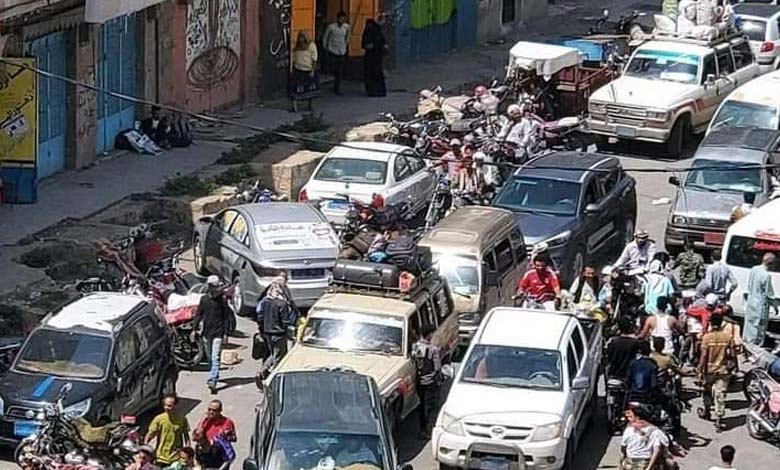Reopening of a Vital Road in Taiz After Nearly 10 Years of Houthi Siege
Hundreds of Yemenis gather near the entrance to Taiz city, expressing their joy at the resumption of travel through this vital road

Yemenis expressed their great joy at the reopening of a vital road in Taiz city in the southwest of the country for the first time in nearly 10 years. The road had been closed due to a siege imposed by the Houthi group, which caused significant suffering for the residents and deprived them of many essential services.
Earlier today, the “Taiz Axis” military unit affiliated with the Yemeni army stated, “The Jola al-Qasr – Hodeidah Road has been officially opened after the removal of barriers.”
The statement added, “Citizens are now able to travel from Taiz city, which is under government control, to the Hoban area, which is under Houthi control.”
Hundreds of Yemenis gathered near this entrance on the Taiz side, singing in joy as travelers passed through the reopened road.
Activists shared a video of an elderly man from Taiz shedding tears of joy near the entrance, as he can now reunite with relatives in the Hoban area after nearly ten years of separation.
Officially, Taiz Governor Nabil Shamsan said on the platform X, “Today, the dreamers in Taiz win, and life returns to the city. Today, blood flows through the vein, and the limbs begin to move. These are the efforts of years of pressure and negotiation with the international community that have finally led to the resumption of life.”
Journalist Khalil Al-Amri stated on the platform X, “The people of Taiz and neighboring provinces are overcoming years of tragedy, separation, and distance, gathering the scattered city and redrawing the map of joy.”
He added, “People have the right to rejoice and celebrate the reunification of distant families harmed by the siege, and we have the right to rejoice as we witness the embrace of brothers and the reunion of streets.”
Journalist Mohammed Al-Sharaabi commented on the same platform, “This is a day to remember fondly, as the efforts of good intermediaries and the warring parties have resulted in opening the Hoban – People’s Palace entrance in eastern Taiz.”
This development follows days after the Houthis announced an initiative to reopen the road, which the government welcomed, accusing the group of imposing a siege on the city for years.
Since early 2015, the Houthis closed the road, causing significant suffering for the residents who had to take rugged paths that took about six hours from Hoban to Taiz city instead of a quarter-hour journey on the previously closed road.
The Hoban road connects Taiz with the provinces of Ibb, Dhamar, and Sana’a in the north of the country. The group closes most roads leading to government-controlled areas in Taiz province, according to Yemeni human rights and humanitarian organizations.
These organizations accuse the Houthis of imposing a siege on Taiz since 2015, preventing humanitarian aid convoys from reaching the residents and war-affected people to achieve political gains, which the group denies.
For about two years, Yemen has witnessed a truce in a war that began around 10 years ago between government forces and Houthi forces controlling provinces and cities, including the capital Sana’a, since September 2014.
In another development, the Yemeni Presidential Leadership Council announced today the receipt of the fourth installment of the Saudi grant to Yemen, estimated at $1.2 billion.
In August 2023, Saudi Arabia announced economic support to Yemen with $1.2 billion in response to the Yemeni government’s request to help address the general budget deficit. The first installment of $250 million was provided in the same month, followed by the second and third installments in January and February, respectively.
Yemeni President Rashad Al-Alimi said on the platform X, “Today, the Kingdom’s leadership kept its promise by depositing a new installment of its generous grant to the general budget.”
He added, “The new installment will have a significant impact on the state’s ability to meet its obligations, primarily paying employee salaries and addressing growing service and humanitarian needs.”
Yemeni Prime Minister Ahmed Awad bin Mubarak stated on the same platform, “This support will enable the government to pay state employees’ salaries, improve electricity services, halt currency depreciation, and proceed with the financial and administrative reform program.”
While the Yemeni government did not specify the deposited amount, a source in the Yemeni Central Bank estimated it at about $500 million.
In another context, the United Nations warned today of potential catastrophic consequences in Yemen due to the presence of two competing monetary authorities and the government’s threat to cut off banks in Houthi-controlled areas from the SWIFT financial messaging system.
The United Nations relief operations director, Edem Wosornu, said the government and the Houthis issue “increasingly entrenched and competing directives” prohibiting individuals, companies, and local and international financial institutions from dealing with banks in competing areas.
Wosornu added to the United Nations Security Council, “This includes a potential imminent decision to exclude banks in Sana’a from the use of the international SWIFT financial messaging system, preventing these banks from facilitating international financial transactions.”
She added, “These developments have potentially catastrophic consequences. They threaten to further divide and weaken the already fragile Yemeni economy.”
The United Nations states that more than half of Yemen’s population, about 18 million people, need humanitarian aid. It asserts that more than two million children could suffer from acute malnutrition, and it recently warned of a rapid spread of cholera.
Wosornu added that the volatile banking environment has serious repercussions on humanitarian operations and said to the 15-member United Nations Security Council, “If banks in Sana’a and other areas controlled by Houthi authorities are cut off from international financial institutions and networks, we will lose the ability to transfer the funds needed to maintain life-saving humanitarian operations.”












